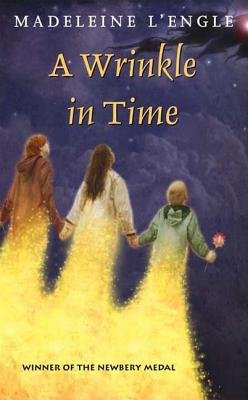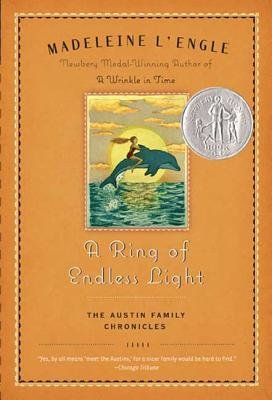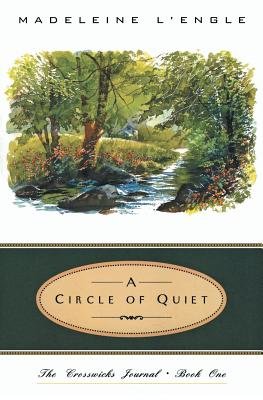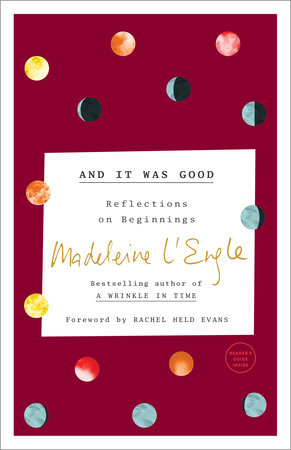I spent a good portion of my 10th birthday in tears.
“I don’t want to be 10!” I sobbed to my mother. “Double digits means OLLDDDDDDD!!!!!”
To her great credit, my mom neither laughed at nor scolded me for my ridiculousness. She just hugged me, comforted me, and then we had cake. And cake, of course, makes everything better.
And for me, so did books. My mother gave me many, many gifts, and one of the biggest that year was a nightly read-aloud of Madeleine L’Engle’s A Wrinkle in Time. By many people’s standards, 10 is “old” for bedtime stories. We didn’t pay attention to those people. We were a robustly bookish and storytelling family. On that birthday, we were living in Lagos, Nigeria, having moved from Washington, D.C., and would soon to be on our way to the suburbs of New York City. We had been away from most of the family that I knew well, and I was adjusting to another in a long line of new schools with its own set of rules, feeling betwixt and between, which often seems emblematic of those early double-digit years.
I remember our A Wrinkle in Time readings as a very special just-the-two-of-us time. My little sister must have had her own read-aloud and her own time — in true big sister fashion, I didn’t really pay attention to that. My mom seemed to know that I needed a bedtime story more than ever, and my own story in particular.
I was immediately in love with A Wrinkle in Time. This book had it all. It had SCIENCE! And math — the kind of math that was interesting and story-like and that explored questions about the universe. It had a fluid transition from the “real” world to worlds that felt true at my core, even as they were the products of Madeleine L’Engle’s wonderful imagination. There were the Mrs, who were like the aunties I had all over the world. There was Meg Murry, who was prickly, sometimes even rude — ways that I, a generally well-behaved child, often longed to be — and it was okay! Meg showed me that you could have faults and thrive, that perfection wasn’t what saved the day.
In Meg, I saw someone who was flawed, who did the right thing even though she sometimes dared to balk at it, who was a hero that, all the while, was also a mistake-prone, gaffe-heavy real human being. And when my mom and I got to the part in the story when Calvin tells Meg that he likes her — the real her, as she is — we both squealed with delight. At 10, glasses and braces were CLEARLY on the horizon for me. Meg had both. She was not your typical storybook princess. Here was an awkward, often angry girl who loved and was loved back fiercely.
We moved back to New York, and I continued to read Madeleine L’Engle’s works. I entertained the idea of becoming a marine biologist because of A Ring of Endless Light. Many years later, A Circle of Quiet comforted me during my mom’s sudden, intense, and brief struggle with multiple sclerosis. Madeleine’s books reminded me that it was okay to ask questions, to challenge and be challenged, to be unhappy sometimes, and to write in a way that, as she put it, disturbs the universe.
“Writing fiction is definitely a universe disturber, and for the writer, first of all. My books push me and prod me and make me ask questions I might otherwise avoid. I start a book, having lived with the characters for several years, during the writing of other books, and I have a pretty good idea of where the story is going and what I hope it’s going to say. And then, once I get deep into the writing, unexpected things begin to happen, things which make me question, and which sometimes really shake my universe.” —Madeleine L’Engle
When my mother died only five years after she fell ill, I read A Wrinkle in Time again, over and over, hearing her voice say, “It was a dark and stormy night,” and reconnecting with my 10-year-old imagined storms and my young adult dark nights. I wrote and raged and cried and remembered in my journals. Feeling unmoored and restless, I considered attending a new church and I visited one in New York City that Madeleine had often mentioned in her nonfiction. The first time I went to a service, there she was: Madeleine herself, right at the entrance, as though she were inviting me in. She was wearing a festive sort of cloak and hat, and it felt like I was walking into a story. I continued to attend and became a member. Later, I had the opportunity to sign up for the very low-cost writing workshop that Madeleine L’Engle offered through the church. I was thrilled. I knew that I would show up, she’d tell us lovely stories, and we’d sit, bask in her tales, and take light notes.
Of course, that’s not how it went. Madeleine made us work and stretch and challenge ourselves in just the same way her books did. When she announced a poetry assignment, I smiled to myself and airily raised my hand. “I don’t write poetry,” I explained. I wasn’t good at it, so it was something that I just didn’t do. In past courses, I’d written something else as an alternative assignment and that was surely how it would be this time. Madeleine would understand that the rules didn’t apply to me.
Of course, that’s not how it went either.
I was quickly made to understand that there were no “alternative” assignments in this class. Okay, fine. But we were expected to read our work aloud every week and that was something I certainly would. not. do. I returned to class the following week, my assignment completed, my lips zipped.
“Nonsense,” said Madeleine. “Read.”
I squirmed. “No, I really don’t, um, like it, and it’s just … everyone’s is so good. I just couldn’t really…”
“Just hurry up and read,” she said. I should have gotten it then, but instead I ducked my head, smiled some more, shrugged a little, and said, “It’s okay, it’s just…”
My classmates looked on with reassuring smiles. This was the part where I expected Madeleine to tell me how good all of my other stuff was, then tell me she understood and looked forward to my next submission. Instead, she SHOUTED (and I do mean SHOUTED), “If you’re going to be a perfectionist, you’ll never get anything done.” My classmates looked at me with less reassuring looks — now with more Oooh, now you’re in trouble expressions and a few Now look what you’ve done grimaces.
Mortified, I read my poetry aloud. Madeleine said, “It’s lovely.” (It was okay.)
And we moved on.
I didn’t go back to class for three weeks. When I returned for the last class, she simply said, “I’m glad you came back.”
After the workshops ended, Madeleine and I corresponded. I got over myself and thanked her often. We saw each other a few times after that, usually at the Cathedral of St. John the Divine. The last time I saw her, she was sitting in a wheelchair, looking as lively as ever, and everyone was buzzing about her but too shy to approach. I knew the folly of being shy around Madeleine; I said hello and we spoke for a few minutes. She invited me to join an upcoming workshop she would hold at the Cathedral.
“But I already took the other one,” I said. “I thought you could only do it once.”
“It’s my workshop. I make the rules,” she said briskly, “and I say you can come.”
So I did. And I got something done.
I still do, through the questions and the wonder and the flaws and the incredible love that surrounds me … and through many dark and stormy nights.
-
Books by Madeleine L’Engle
-
A Wrinkle in Time
Preorder from:A Circle of Quiet
Preorder from:And It Was Good: Reflections on Beginnings
Also available from:




